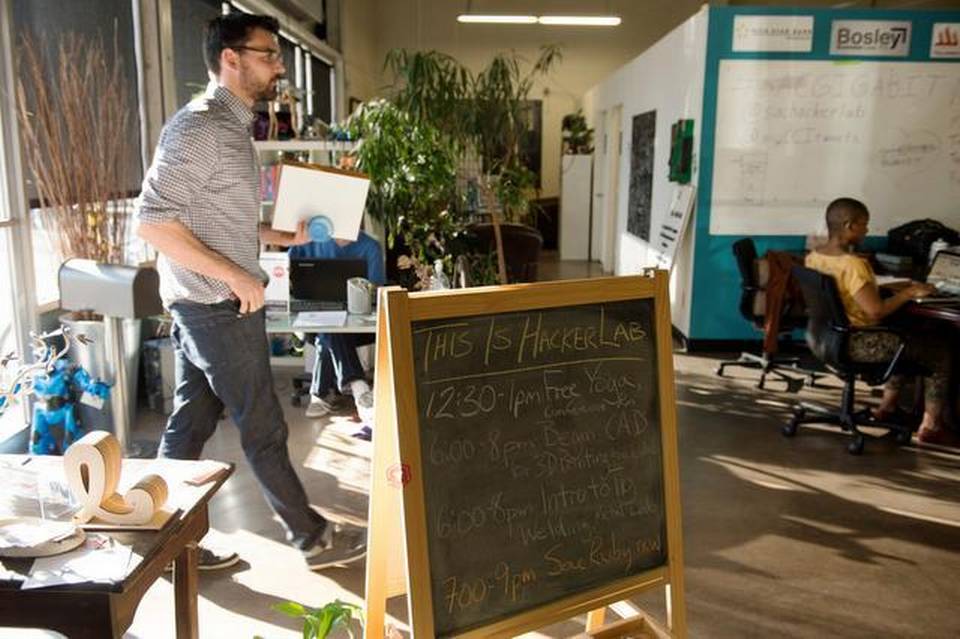By Ed Fletcher
The Sacramento Bee.
No longer a novel concept, “co-working” spaces are growing up.
But increasingly, they’re also about more than just work.
While they do provide space for freelancers, independent contractors and other work nomads to plop down with their laptops or find a private office for a nominal membership fee, they’re also serving as quasi-community centers, with common areas that draw more than just paid members.
“We do co-working, but we’re so much more than that,” said Gina Lujan, Hacker Lab’s chief executive officer.
Hacker Lab’s common space — a large “L” shaped room — was bursting at the seams Tuesday as it celebrated its third anniversary, which included a visit from Congresswoman Doris Matsui, D-Sacramento.
Under the banner of “Build. Code. Unite,” Hacker Lab has grown into a hub for the tech community and a well-equipped workspace for the region’s “makers,” people who enjoy turning ideas into something tangible, anything from video games to lighting displays. At Tuesday’s event, the “maker” space (filled with 3-D printers, soldering irons and sewing machines) felt like a show-and-tell schoolroom, with various made-on-site projects on display.
Hacker Lab is just one player in the Sacramento region’s evolving constellation of community-minded co-working spaces. In September, three of Sacramento’s shared workspaces were ranked among the best 75 in the country. Symmetry50.com, which provides bookkeeping services for startups, listed The Urban Hive at No. 7, Hacker Lab at No. 9 and Capsity at No. 24.
And while midtown’s ThinkHouse closed its doors earlier this year, other shared workspaces are moving in or expanding. In January, Outlet Coworking took over a former art gallery on K Street. Hacker Lab, in partnership with Sierra College, is opening a new location in Rocklin. And in Elk Grove, Greg McAvoy-Jensen, owner of a Web design firm, plans to open his own co-working space, InnoGrove, later this year.
In a phone interview, Matsui said co-working spaces, which first became popular in 2005, have become vital community anchors that spark innovation. The key, she said, is getting the “nerdy crowd” to interact with each other and share ideas.
“This is working together at the ground level. They don’t know what idea or thing will come out of it,” said Matsui. “It’s very organic in a way.”
The congresswoman, who sits on the communications and technology subcommittee of the House Energy & Commerce Committee, said, “Innovation is really the key to growing our economy.”
Sacramento Mayor Kevin Johnson also sees value in shared working spaces.
“Like the assembly line of past generations, co-working spaces will be the drivers of our new economy,” Johnson said in an emailed statement. “In this new era, which I call Sacramento 3.0, where we are a hub of innovation, technology and entrepreneurship, we need to create more co-working spaces like Hacker Lab that will help foster an environment of entrepreneurs working in a community, where they can create, develop and share better ideas faster.”
The changing work landscape means more people will work from home or from shared spaces, said Kimberly Elsbach, a professor of organizational behavior at the UC Davis Graduate School of Management. She said that while some types of work — like software coding — can be done faster at home, creative ideas typically percolate from a collaborative environment.
“You don’t have anyone to bounce ideas off of” while working from home, Elsbach said. But working side by side, you might find someone who can design your website logo or expose you to a new way of solving a problem. “That kind of environment is really good for cross-collaboration,” Elsbach said.
Sharing the “ecosystem of ideas” is important, said Brandon Weber, who manages The Urban Hive. “If you’re not talking to each other, you don’t get to share each other’s strengths,” said Weber, who also curates the TEDx Sacramento lecture series.
The demand for co-working spaces is robust, according to a December survey by Deskmag.com, an online magazine that follows the global co-working industry. Nearly 300,000 people worked in nearly 6,000 co-working spaces worldwide in 2014, it said. Its survey also found that 60 percent of co-working offices expected to expand, with a majority reporting “the availability of desk space in co-working spaces can’t keep up with the public’s demand.”
This spring, the Global Coworking Unconference Conference will be held May 6-8 in Berkeley, with co-working tours and sessions on financing, technology tools, brand, real estate and other topics.
In Sacramento, each of the city’s established co-working spaces has its own distinct identity. The Urban Hive advertises itself as a hub for “designers, coders and creatives.” Capsity, managed by Jeff Louie, attracts a mix of established professionals and entrepreneurs — including an attorney, a pet-sitting business and a magazine. Hacker, as the name suggests, is more tech-focused.
Most co-working spaces in Sacramento charge a basic monthly membership fee, which can range from $99 to $200. There’s an additional cost to rent private office space.
But they welcome the public. The Urban Hive, for instance, hosts its monthly Changemakers Mixer, where community innovators are invited to a question-and-answer session. At Capsity, there’s an active group of gamers who meet to share their video- and board-game creations.
Most operate with minimal staffing. Hacker Lab, for instance, has only two paid employees, but relies on some 50 volunteers to greet guests, teach classes and orient new members.
Capsity’s Louie predicts there will be more traditional businesses borrowing a page from co-working spaces, as a way to encourage collaboration among their employees.
“It’s the new workspace,” Louie said. “It’s the future of work.”














































































































































































































































































































































































